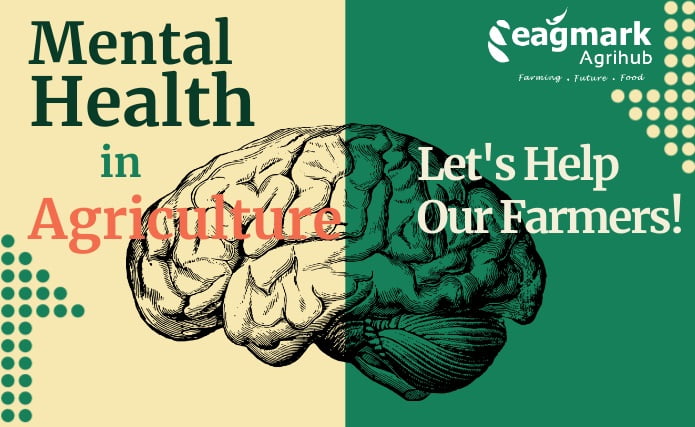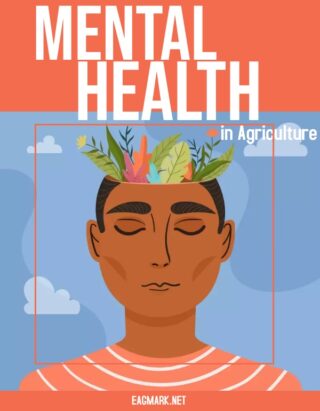Field of Mind – Exploring the Mental Health Crisis in Agriculture

⬤ According to the Center for Disease Control and Prevention (CDC), farmers are among those who are at greater risk of dying by suicide.
⬤ The impact of agricultural work extends far beyond physical exertion; it takes a profound toll on the mental well-being of those who dedicate their lives to this noble profession.
Modern-day agriculture has witnessed remarkable transformations, revolutionizing how we cultivate crops and breed livestock to feed an ever-growing global population. Technological advancements and innovations have ushered in convenience and efficiency to farming practices across many regions. However, amidst the progress, farmers find themselves grappling with new challenges and mounting pressures, propelling them into a relentless pursuit of maximizing yields.
Climate change, erratic weather patterns, volatile markets, pest and disease outbreaks, lack of financial incentives, population growth that encroaches upon fertile lands, and an escalating demand for food have coalesced into formidable obstacles, making sustainability an elusive goal for farmers.
Yet, the impact of agricultural work extends far beyond physical exertion; it takes a profound toll on the mental well-being of those who dedicate their lives to this noble profession. Men and women tirelessly labor in the fields, nurturing the soil and tending to crops and livestock, all while facing unique obstacles that can profoundly impact their mental health. Stress, depression, and the harrowing specter of suicide loom large, necessitating urgent acknowledgment and concerted efforts within the farming community.
Within the realm of agriculture, an array of stressors bears down heavily on farmers’ minds. The grueling demands of long hours, incessant financial pressures, and the unpredictable nature of the industry create an immense burden that, if left unaddressed, can exact a devastating toll on mental well-being.
Moreover, the profound sense of social isolation poses yet another formidable challenge. Many farmers toil in solitude, whether on sprawling farms or in remote areas, leaving them with limited social interaction. This absence of regular connection exacerbates existing mental health issues, rendering farmers vulnerable to the corrosive effects of loneliness and isolation.
Depression, a prevalent mental health concern among farmers, must never be underestimated. When left unaddressed, it wreaks havoc on individuals’ lives and jeopardizes their livelihoods. Symptoms such as lingering sadness, hopelessness, disrupted sleep patterns, difficulty concentrating, and a loss of interest in activities that once brought joy erect insurmountable barriers to personal and professional fulfillment.
 Yet, perhaps the most alarming aspect is the elevated risk of suicide within the farming community. Distressing statistics reveal that farmers bear one of the highest suicide rates across all occupations. Farmers have one of the highest suicide rates across all occupations.
Yet, perhaps the most alarming aspect is the elevated risk of suicide within the farming community. Distressing statistics reveal that farmers bear one of the highest suicide rates across all occupations. Farmers have one of the highest suicide rates across all occupations.
According to the Center for Disease Control and Prevention (CDC), farmers are among those who are at greater risk of dying by suicide. The CDC states that this is driven in part by extreme stress of debt, drought and other factors1. In Australia, the average suicide rate in farmers was almost 60 per cent higher than non-farmers. In India, every day, 28 people dependent on farming die by suicide.
This heartbreaking reality underscores the imperative need for proactive intervention and robust support systems.
The agricultural community must address the struggles of farmers’ mental well-being by focusing on mental health support to combat stress, depression, and suicide risks.
To confront these critical mental health concerns head-on, it becomes paramount to prioritize the well-being of farmers by ensuring they have unfettered access to vital resources and support networks. Mental health services, encompassing counseling and therapy, must be readily accessible, enabling individuals to seek help when needed. Establishing support groups where farmers can forge connections with peers fosters a sense of community, offering a secure space for sharing experiences and coping strategies.
Moreover, offering resources for financial and legal assistance can alleviate the burden of financial stress that weighs heavily on farmers. Agricultural organizations and employers play a pivotal role in promoting mental health initiatives. By cultivating a workplace environment that nurtures open dialogue, extends support, and acknowledges the unique stressors encountered by farmers, they become agents of positive change.
In response to this profound issue, organizations such as Eagmark emerge as torchbearers, championing the cause of farmers’ mental well-being. Through awareness programs such as the Agricultural Health and Medicine Course and articles like this, they aspire to dispel the stigma surrounding mental health concerns and foster a culture that appreciates and prioritizes the psychological welfare of those who sustain our agricultural systems.
With this in mind, the agricultural sector must confront and address the challenges afflicting farmers’ mental health. By acknowledging the stress, depression, and suicide risks ingrained within farming, we can take proactive strides in establishing vital support systems. Together, we can cultivate a resilient farming community that thrives not only on the land but also within the minds of those who tirelessly tend to it, nurturing a brighter and healthier future for farmers worldwide.



